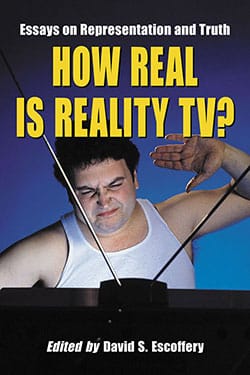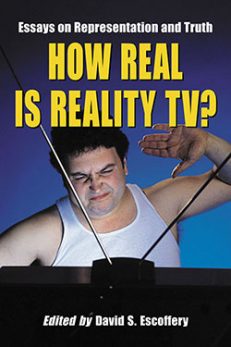How Real Is Reality TV?
Essays on Representation and Truth
Original price was: $29.95.$23.99Current price is: $23.99.
In stock
About the Book
American viewers are attracted to what they see as the non-scripted, unpredictable freshness of reality television. But although the episodes may not be scripted, the shows are constructed within a deliberately designed framework, reflecting societal values. The political, economic and personal issues of reality TV are in many ways simply an exaggerated version of everyday life, allowing us to identify (perhaps more closely than we care to admit) with the characters onscreen. With 16 essays from scholars around the world, this volume discusses the notion of representation in reality television. It explores how both audiences and producers negotiate the gulf between representations and truth in reality shows such as Survivor, The Apprentice, Big Brother, The Nanny, American Idol, Extreme Makeover, Joe Millionaire and The Amazing Race. Various identity categories and character types found in these shows are discussed and the accuracy of their television portrayal examined. Dealing with the concept of reality, audience reception, gender roles, minority portrayal and power issues, the book provides an in-depth look at what we see, or think we see, in “reality” TV. Instructors considering this book for use in a course may request an examination copy here.
About the Author(s)
Bibliographic Details
Edited by David S. Escoffery
Format: softcover (6 x 9)
Pages: 287
Bibliographic Info: notes, bibliographies, index
Copyright Date: 2006
pISBN: 978-0-7864-2624-9
eISBN: 978-1-4766-0228-8
Imprint: McFarland
Table of Contents
Introduction: The Role of Representation in Reality Television 1
PART I: REPRESENTATION AND REALITY: HOW “REAL” IS REALITY TV?
1. “When Will I Be Famous?” Reappraising the Debate about Fame in Reality TV 7
2. The Psycho-Economy of Reality Television in the “Tabloid Decade” 26
3. Training Camps of the Modular: Reality TV as a Form of Life 42
PART II: REPRESENTATION AND AUDIENCES: HOW DO AUDIENCES DECODE/UNDERSTAND REALITY TV?
4. Viewer Interpretations of Reality Television: How Real Is Survivor for Its Viewers? 61
5. Marketing “Reality” to the World: Survivor, Post-Fordism, and Reality Television 78
6. Domestication Incorporation: Cribs and The Osbournes as Narratives of Domestication 97
PART III: REPRESENTATION AND GENDER: HOW DOES REALITY TV REPRESENT WOMEN?
7. How Women Really Are: Disturbing Parallels between Reality Television and 18th Century Fiction 115
8. Female Police Officers and Reality Television: Analyzing the Presentation of Police Work in Popular Culture 133
9. The Cutting Room: Gendered American Dreams on Plastic Surgery TV 149
PART IV: REPRESENTATION AND DIFFERENCE: HOW DOES REALITY TV REPRESENT “THE OTHER”?
10. Playing with Hooks: Neo-tribal Style, Commodification and Resistance 167
11. “Sexual Racism” and Reality Television: Privileging the White Male Prerogative on MTV’s The Real World: Philadelphia 180
12. Racism and Reality TV: The Case of MTV’s Road Rules 195
13. The Amazing “Race”: Discovering a True American 212
PART V: REPRESENTATION AND POWER: HOW DOES REALITY TV REPRESENT POLITICS?
14. Games of Sociality and Their Soft Seduction 231
15. Democracy at Work? The Lessons of Donald Trump and The Apprentice 247
16. Watching Yourself, Watching Others: Popular Representations of Panoptic Surveillance in Reality TV Programs 259
About the Contributors 277
Index 279
Book Reviews & Awards
- “offers the more academic analysis [than the competition]…recommended”—Choice
- “various identity categories and character types found in these shows are discussed…provides an in-depth look at what we see, or think we see, in ‘reality’ TV”—New Books in the Communications Library





